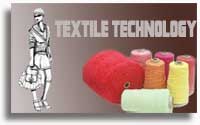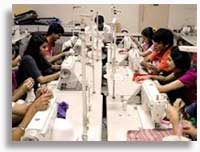TEXTILE TECHNOLOGY
Textile Technology
In today's fashion scenario, textiles play an important role as costumes reflect ones' personality. The Textile industry not only includes woven, knitted or printed fabrics used for making clothes but also includes materials used for furnishing, upholstery, carpets, lace, etc. The production of this enormous variety of textiles creates the need for a career in Textile Engineering. Textile Engineering is that discipline of engineering which deals with the manufacturing of textiles. Textile Engineering is also known as Textile Technology.Textile engineers can also find attractive opportunities in textile mills, export houses, knitwear manufacturing units, textile dyeing and printing units.
A large number of government-sponsored and private silk, handloom, jute, khadi, and craft development organizations need textile technology expers. Typical employers include companies that produce clothing, soft furnishings and other textile-based products, big fashion retailers, design studios and consultancies. One with a degree in textile engineering can work as operations trainee, technical services assistant in a textile plant, process engineer, assistant designer in a design studio, quality control supervisor, sales in charge, fabric development executive, process improvement engineer, etc. Graduates are recruited in large numbers by textile giants like Arvind Mills Ltd., Bombay Dyeing, Raymond's, Fabindia, Grasim Industries, JCT Limited, Lakshmi Mills, Mysore Silk Factory, etc. Textile Engineering is the study of textile production, processing and it's compatibility for the use of common man. It combines the principles of engineering with specific knowledge of textile equipment and processes.
This field of engineering draws inputs from various other branches of engineering like chemical, instrumentation,computer,structural,electronicandmechanicalengineering. Textile technology/Engineering deals with the application of scientific and engineering principles to the design and control of all aspects of fiber, textile and apparel processes, its products and machinery. These include natural and man-made materials, interaction of materials with machines, safety and health, energy conservation, and waste and pollution control. There is wide scope for research in this area as the industry demands the need to improve currently available products and develop new ones. Textiles are utilised for innumerable purposes other than the manufacturing of garments. They are used in the manufacturing of carpets and furnishing like bed sheets and bed covers, quilts, table cloth, curtains and towels, etc. It is also used for rags and dusters, tents and nets, kites, parachutes, etc. Textiles have industrial uses as well. They are incorporated in firefighting suits, shuttle space suit, in carbon fiber composite rocket exhausts, and even in nose cones for NASA. According to its usage and texture, textiles are classified as Technical Textiles- made of zinc oxide and nanowires which enable protection from heat and radiation.Examples of Technical Textiles are protective clothing like firefighting suits, those designed specially for astronauts.
Medical Textiles - besides gauze and bandage, textiles are also being used as sutures, orthopaedic implants, vascular grafts, artificial ligaments, artificial tendons, heart valves and even as artificial skins. Recent advances in medical textiles has led it to be used as extracorporeal devices which include artificial kidney, artificial liver, mechanical lungs, etc. New materials are finding specialized applications like antimicrobial and antifungal fibres and additives used in barrier fabrics, abdominal post-operative binders, applications in neurodermatitis treatment and various other wound management and surgical treatments.
Agro textiles - which protect the farmers and Agricultural Engineers from the adverse effects of soil and pollution.
Geo-textiles - which protect the people during construction work.
The economic scope and importance of technical textiles extends far beyond the textile industry itself and has an impact upon just about every sphere of human activity. Textile Engineering is therefore very important for the development of technology for the benefit of the society.
Educational details

Textile engineers can also find jobs in cotton yarn manufacturing corporations, and research laboratories for testing and quality control. Manufacturing units of technical textiles like agro textiles and medical textiles is another area of employment where textile engineers are in great demand. Another option is self employment, i.e. to start own textile manufacturing unit. Teaching and research is another option for textile degree holders. They can work as lectures in universities/ institutes teaching this subject. They can develop new fiber or even new techniques for treatment of fibers. The coursework of textile engineering include study lessons from other engineering streams, such as mechanical, chemical, materials, and industrial, apart from other fundamental course programs, the most important being thermodynamics, materials science, industrial management, applied mechanics, and engineering drawing and design. There are varied branches of Textile Engineering. Textile engineers can attain specialization in any of these fields like Textile Chemical Technology, Fiber Science Technology, Technical Textiles, Computer Application in Textile, etc.
Selection
Admission to B.E/ B.Tech courses is made on the basis of the marks obtained in +2 and the merit in the entrance examinations (e.g. IIT JEE, AIEEE, BITSAT, state entrance Exams, etc.) conducted both at national and state level. In state Entrance exams selection will be based on the rank obtained in the entrance exam. Selection to the M.E/M.Tech courses is through GATE examination (The Graduate Aptitude Test in Engineering). Admissions to some of the institutions are made by their own separate entrance exams.
Duration :
B.E / B.Tech courses in Textile Engineering are of 4 years (8 semesters) duration while ME/ M.Tech course in Textile Engineering are of 2 years.
Personal skills required

They must understand the properties of different materials and dyes and the production processes of textiles. Textile engineers must have knowledge of the market, be able to predict new trends and be updated with continuous changing technology in this field.
Some job profiles
Researchers, Technologists, Process Engineer, Operations Trainee, Technical Salesperson, Development Engineers, Medical Textiles Engineer, Quality Control Supervisor and Technical Services / Sales Manager
Institutes offering Textile Technology
Textile Technology |
Remuneration
Textile engineering is one of the lucrative field in the job market. Fresh graduates from good engineering college can earn their initial income around Rs 12,000 to Rs 30,000 every month. The income rises according to their experience and skills. A textile engineer with 2-3 years of industrial experience can earn more than Rs 50, 000 every month excluding other perks and benefits. Fresh graduates with M.tech degree can earn around Rs.20, 000 to Rs.40, 000 every month at the starting level.
